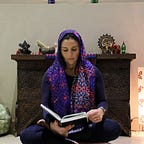Here are some stories to help navigate the madness unfolding in the US, my little world, and my complicity in all
There is something deeply cathartic about sharing our stories, for both the story-teller and the listener. Stories help me learn about myself and unravel the mystery of the world around me. They provoke and disrupt. They soothe and heal. They are unique, it is true. But they are also universal. It is their universality in fact that makes stories — telling and receiving — a powerful learning tool, at least for me.
As I try to wrap my head around the madness unfolding in the US, my little world, and my complicity in all, I found myself recalling a few stories of my own that are beginning to shape an outline of a picture from which to grow.
A few months ago, I learned about the story American Dirt from Oprah Winfrey’s book club. I had not been reading much fiction, and it sounded like a good re-introduction to the fabulousness of creativity. I did not know anything about the controversy surrounding the author, Winfrey, and the publisher. I learned soon after that the Latinx community was deeply offended that a non-Mexican author would write a story about Mexican migrants. Calls were made for Winfrey to retract her book choice. Eventually, Oprah Winfrey hosted the author Jeanine Cummins, a number of Latinx writers vocal in their condemnation of the book, and the publisher for a discussion. I watched it and felt so sad for all of them. It was a mess, not unlike the many messes preceding and following that fracas. And it was no one’s fault. The author was sincere and had good intentions. The Latinx writers had a legitimate case demanding their voices be heard, and the publishers I heard seemed genuinely unaware of systemic, endemic racism both in their own psyche and in the system itself. I thought the book was great, a painful window into the plight of Mexican migrants and the brutality and sophistication of the Mexican gang world. I felt the author deserved every penny she got.
Then, a friend asked me, “How would you feel if an Israeli profited from telling the story of the plight of Palestinians living under occupation?” I had no trouble answering. “I would welcome it.”
I changed my mind.
A few days ago, I woke up to an email from my niece who has very recently graduated — virtually like thousands of others — from college in the US. In it, she shared her struggles to understand what is unfolding in the US in the aftermath of the brutal murder of George Floyd by police. She expressed so eloquently her sadness, confusion, and sense of helplessness. She invited me to take some time to look at my own internalized prejudices. And then she shared a list of resources to educate myself on the struggle of the African-American community and the history and context of racism and injustice.
I jumped in.
Yesterday, I received a message from a new friend in Canada who happens to be white. She shared with me the same sense of helplessness and despair. Was it enough to post #blacklivesmatter on social media? Change our wall background to black? Do we absolve ourselves of our complicity if we condemn racism on Facebook? Offer prayers? Donate money?
Haven’t we lived this movie before?
At the heart of this universal story of struggle is injustice. At the heart of this is someone who has anointed themselves “better” than the other. And this injustice has run so deeply in humanity it is inherited from one generation to the other. Most of the time, we are not even aware of it. Until a young, 22-year-old college graduate invites us to take a look inside.
She asks me what I see.
I see my prejudice in my language, my behaviour, my choices, and my actions. I recall the prayer that I repeated every evening for the past month of Ramadan at sunset, asking God to protect the “Muslim people” from disease. I notice my bypassing when uncomfortable topics including sexuality and gender come up. I remember how my housekeeper sits at the far end of the kitchen counter when we have a meal. I think how I refer to our building porter by his nationality — not his name. The list goes on but it is too painful to complete.
Injustice ends with us acknowledging its existence in our own bedrooms.
This is what we can do my friend. Before we sit on the bench to cheer, we need to stand at the gates of the field and open them wide. We need to step aside so those we hurt can roar. We need to listen to their stories. The playing field must not be levelled. We need to dot it with hills and mountains. We need to build them stages, and then handle the lighting.
The Latinx authors were right. Publishers should have been falling over themselves to publish their stories. They have earned the right to tell their stories. As have Palestinians living under one of the 20th century’s darkest stories of injustice and oppression.
I will be spending some time in my bedroom and then move on to my kitchen counter, where others can sit. And I can listen.
